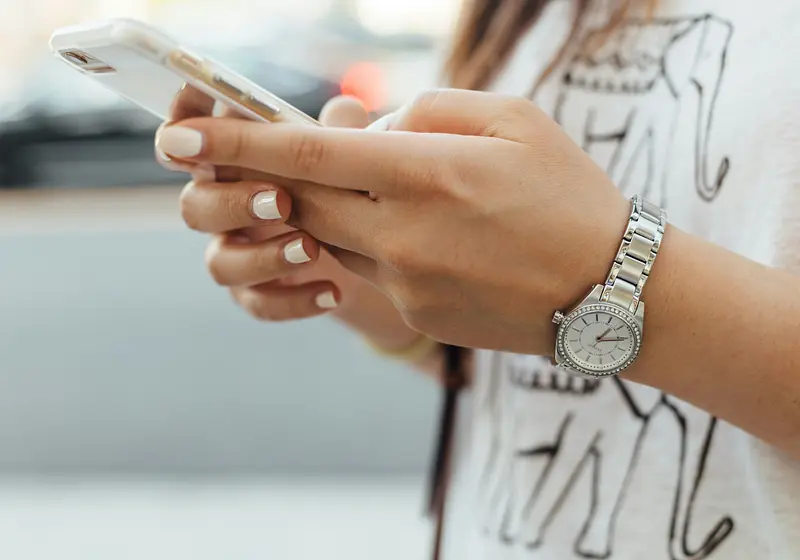People often say that their phones are an extension of themselves. Nearly everything in our lives revolves around our phones, from the daily news to Zoom meetings and entire businesses.
With the territory of comfort comes a growing sense of unease—could our phones, these ever-present companions, be working against us?
Although the entirety of our lives could be stored online, it is imperative that we function just as efficiently, if not more, in the offline world. This article explores both the pros and cons of this statement.
Let us slide into your dms 🥰
Get notified of top trending articles like this one every week! (we won't spam you)The Dark Side of Smartphones
A study in the Journal of the Association for Consumer Research found that cognitive capacity was significantly reduced whenever a smartphone is within reach, even when the phone is off.

Photo by Kenny Leys on Unsplash
The research focused on a situation where smartphones were merely present but not in use. Since we have a finite pool of attentional resources supporting other processes besides attention, the resources allocated to exhibiting attention to one's phone are now unavailable to be utilized in other tasks that are, arguably, more important.
Researchers referred to this phenomenon as "brain drain," suggesting that even when consumers successfully controlled their attention, the availability of attentional resources was still low.
Take the Quiz: Which Indian city is the perfect holiday spot for you!?
Let's match you with an Indian city that you would love!
Smartphones are Comparable to Gambling
In the words of UNC Health neurologist Jorge L. Almodóvar-Suárez, MD, "Social media, in my view, provides the user with inconsistent positive reinforcement, similar to gambling… In fact, the user may unconsciously change their views to appease friends who provide likes, and select a friend population with shared values."
The core principle of gambling revels in uncertainty. Specifically, it's the uncertainty of either winning or losing. This morphs into a variable reward system, triggering the release of dopamine, a neurotransmitter associated with pleasure.
Similarly, the very design of a smartphone renders it a catalyst for cheap yet frequent dopamine boosts. Users keep checking their phones, looking forward to their next hit. Just like gambling, smartphones play on the uncertainty of users in the form of social media notifications, games, and the constant stream of new information being pushed to the users at all times.
Hence, social media could indirectly rewire our brains to always crave instant gratification. A prolonged effect of this could lead to overdependency on our smartphones. Relying on smartphones to store not just passwords but addresses or directions to stores around town could lead to lowered cognitive capacity, too.

Photo by Elly Brian from Unsplash
Studies suggest excessive use can disrupt sleep, strain our eyes, and even contribute to anxiety and depression.
An excess of information being conveyed can lead to an "information overload." Negative effects of this include spiraling into a mania about all the worst-case scenarios presented by your smartphone and crippling anxiety. This sense of unease is heightened because filtering fact from fiction is often difficult.
While smartphones serve as a gateway to new portals of information and knowledge, decision fatigue and lowered, attention spans contribute as overarching side effects. Practicing mindfulness and setting limits on phone time can help tame the unease.
Who's to Blame Here?
But is the phone itself the culprit, or how do we utilize it?
Maybe the problem isn't the technology but the way we're tempted to prioritize distraction over connection and minute bursts of stimulation over sustained concentration.
One of the primary concerns surrounding smartphones is their tendency to be overly dependent on their users' attention spans. Imagine delving into your overdue Calculus homework only to be distracted by a barrage of notifications and alerts from your phone. This makes an already difficult task even more difficult, leading you to alternate back and forth between your smartphone and your homework. Multitasking might actually drain your brain in the long run.

Photo by CottonBroStudio on Pexels
The excessive usage of phones is shown to drain your social interaction skills. Lively chatter is replaced by the sounds of rapid typing on a keyboard, and emojis replace laughs. Not only is this picture depressing, but it also reduces our social abilities.
Man is a social animal; we must live up to this name! Carefully edited reels and curated Instagram feeds can lead to a phenomenon called FOMO, or the Fear of Missing Out. This distorts reality as people are unaware of fact from reality, leading to a compulsive, anxious dependence on a simple smartphone. Not only does this negatively affect users' self-esteem, but it also propagates a false perception of the world to unsuspecting consumers.
While online communities can be a source of comfort and provide solace to people in difficult situations, navigating the offline world is just as important.
Balancing Being Online and Offline
In a world overflowing with digital temptations, using your phone productively can often feel like an uphill battle. Worry not—here are a few suggestions to help!
The constant barrage of notifications from a million apps can distract even the most seasoned individual. Therefore, set your phone to "Do Not Disturb" and choose the application you'll from consciously receive notifications. This can go a long way toward disciplining yourself and boosting your long-term mental health.

Photo by Helena Lopes from Pexels
Additionally, you can use to-do list apps and timers. This will help you manage your time and energy more efficiently.
Conclusion
The best "method" or "trick" that might work for one is not necessarily one that could work for another. Hence, it's imperative that you experiment with different strategies and ideas to develop a system that works for you as an individual and is tailored to your development.
Best of luck on your journey to becoming a conscious smartphone user!






.jpg)
.jpeg)
.jpeg)











